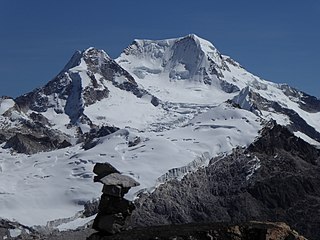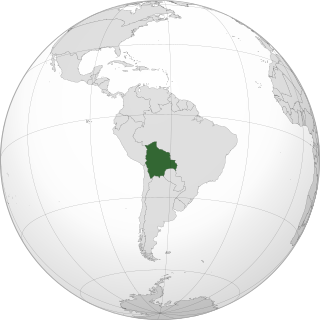Places
- Camba, Ohio in the United States
| This disambiguation page lists articles associated with the title Camba. If an internal link led you here, you may wish to change the link to point directly to the intended article. |
Camba may refer to:
| This disambiguation page lists articles associated with the title Camba. If an internal link led you here, you may wish to change the link to point directly to the intended article. |
Abi or ABI may refer to:
The China–Australia Migratory Bird Agreement (CAMBA) is a treaty between Australia and China to minimise harm to the major areas used by migratory birds which migrate between the two countries. CAMBA was first developed on October 20, 1986 and came into force on September 1, 1988. Eighty-one bird species are listed in the agreement, as per the table below.

The spectral bat, also called the great false vampire bat or Linnaeus's false vampire bat, is a large, carnivorous leaf-nosed bat found in Mexico, Central America, and South America. It is the only member of the genus Vampyrum; its closest living relative is the big-eared woolly bat. It is the largest bat species in the New World, as well as the largest carnivorous bat: its wingspan is 0.7–1.0 m (2.3–3.3 ft). It has a robust skull and teeth, with which it delivers a powerful bite to kill its prey. Birds are frequent prey items, though it may also consume rodents, insects, and other bats.

Pando is a department in the North of Bolivia, with an area of 63,827 square kilometres (24,644 sq mi), in the Amazon Rainforest, adjoining the border with Brazil and Perú. Pando has a population 110,436. Its capital is the city of Cobija.
The folkloric dance of the Tobas speaks of the ancient past of Bolivia. It has roots in a time when the Incas were the predominant force in the Andean highlands region. Tobas is an athletic dance comprising agile steps accentuated with many jumps and bounds.

Germán Busch Becerra was a former Bolivian military officer and hero of the Chaco War (1932–1935), who served as the 36th President of Bolivia twice nonconsecutively, first as de facto president for six days in 1936 and then constitutionally from 1937 to 1939. He served initially as de facto president following his overthrow of then-president José Luis Tejada in 1936 and again as de facto president after overthrowing Tejada's successor David Toro Ruilova the following year. He would later be elected by the National Convention in 1938 as Constitutional President of the Republic only to declare himself dictator just one year later.

José David Toro Ruilova was a colonel in the Bolivian army and member of the High Command during the Chaco War (1932–35) who served as the de facto 35th President of Bolivia from 1936 to 1937. He was one of the leaders of the coup that deposed President Salamanca in November, 1934 and became President of the Republic in May 1936 as a result of a military uprising headed by his friend and comrade, Major Germán Busch.

Carlos Quintanilla Quiroga was a Bolivian general, who served as the 37th President of Bolivia on a de facto interim basis from 1939 to 1940. Quintanilla saw action in the initial stages of the Chaco War (1932–1935), and managed to ascend the echelon of the Bolivian armed forces until he became commander of the army during the administration of Germán Busch. When President Busch committed suicide on 23 August 1939, the Bolivian military entrusted Quintanilla with the role of assuming power and calling elections.

Alberto Natusch Busch was a Bolivian general who served briefly as the de facto 55th President of Bolivia in 1979.
Chiquitano is an indigenous language isolate spoken in the central region of Santa Cruz Department of eastern Bolivia and the state of Mato Grosso in Brazil.

San Ignacio de Velasco, is the capital of the José Miguel de Velasco Province and the San Ignacio de Velasco Municipality in the Santa Cruz Department of Bolivia.
Reyesano, or Chirigua (Chiriba), is a nearly extinct Tacanan language that was spoken by only a few speakers, including children, in 1961 in Bolivia. It is spoken by the Maropa people who number 4,505 in 2012.

Phyllomedusa camba is a species of frog in the family Phyllomedusidae. It is found in Bolivia, Brazil, and Peru.
Anthony R. Dickinson is a British academic, neuroscientist and a Scientific Advisor at the Beijing Genomics Institute. He specialises in brain development and incremental intelligence training. He invented and developed the first four-way implantable brain cannular implant device.

Otuquis National Park and Integrated Management Natural Area,, is a national park in the Pantanal ecoregion of southeastern Bolivia.

Chachacomani is a mountain in the Cordillera Real of the Andes Mountains, east of Lake Titicaca in Bolivia.
The varieties of Bolivian maize are the result of thousands of years of selective breeding for superior agronomic and cooking traits.
Camba is a word historically used in Bolivia to refer to the indigenous population in the eastern tropical region of the country, or to those born in the area of Santa Cruz, Beni, and Pando. Nowadays, the term "Camba" is used predominantly to refer to eastern Bolivian populations of mixed Spanish, Chane, and other indigenous Amazonian descent born in the eastern lowlands in and around Santa Cruz de la Sierra.

The history of the Jews in Bolivia stretches from the colonial period of Bolivia in the 16th century to the end of the 19th century. In the 19th century, Jewish merchants came to Bolivia, most of them taking local women as wives and founding families that merged into the mainstream Catholic society. This was often the case in the eastern regions of Santa Cruz, Tarija, Beni and Pando, where these merchants came either from Brazil or Argentina.
The Republic of Korea–Australia Migratory Bird Agreement (ROKAMBA) is part of international efforts to conserve migratory birds of the East Asian – Australasian Flyway, along with bilateral migratory bird agreements between Australia and Japan and Australia and China. These agreements provide a formal framework for cooperation on issues of mutual interest.